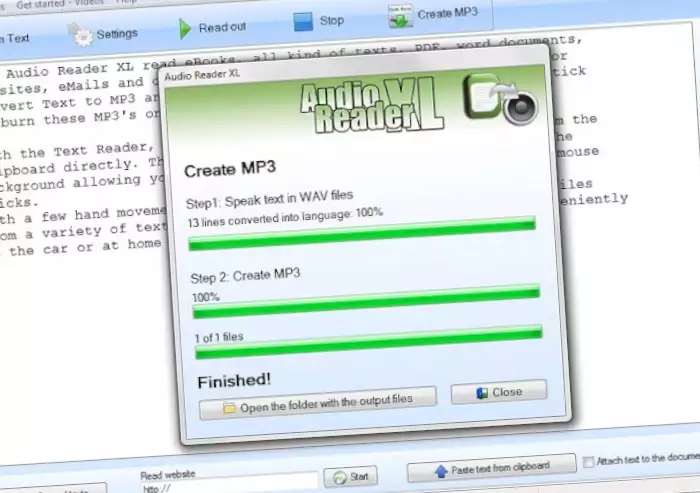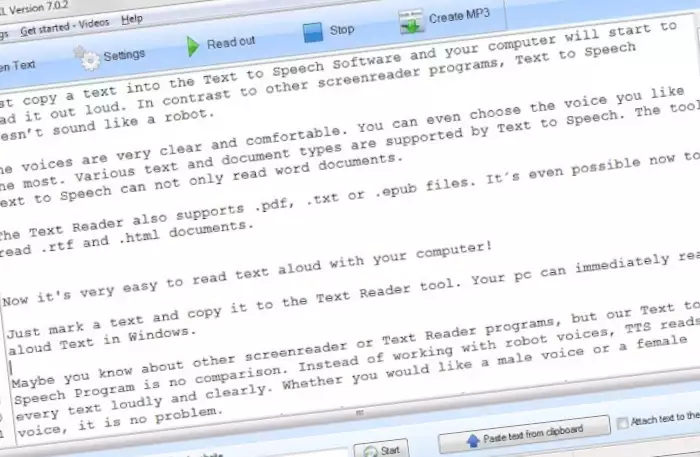Text Reader Software: Unlocking Accessibility and Productivity
Text reader software is a revolutionary tool that converts written text into natural-sounding speech. With advancements in technology, these software applications now offer various features that cater to different needs. Let's explore some of the key benefits and use cases for text reader software. The future implications of read aloud texts with TTS technology are vast. As technology continues to advance, TTS will play an integral role in educational settings, digital accessibility initiatives, and content creation. The impact of this technology will be felt across industries, fostering a more inclusive, accessible, and informed society.
One of the remarkable advantages of text reader software is its ability to provide accessibility for individuals with visual impairments or learning disabilities. By converting written content into audio, it enables them to consume information effortlessly.

Photo of the Text to Speech Reader
Boosting Productivity with Read Aloud Text
This not only saves time but also enhances productivity by enabling multitasking. More about this here: https://mirandai65.weebly.com/blog/text-reader
Reading Aloud Screen Content for Improved Comprehension
Sometimes reading content from a computer screen for an extended period can strain your eyes and affect comprehension. With text reader software, you can have your screen content read aloud to you.
Effortlessly Converting PDFs into Audio
PDFs are widely used for sharing documents due to their fixed formatting and compatibility across different devices. However, reading lengthy PDFs can be time-consuming and tedious. Text reader software comes to the rescue by effortlessly converting these PDFs into audio files. Now you can listen to your PDFs while doing household chores or during your daily commute.
Unlocking the Power of Audiobooks and E-books
Audiobooks and e-books have gained popularity in recent years due to their convenience and flexibility. Text reader software enables you to convert e-books and other written content into audio formats, allowing you to enjoy them hands-free. Whether it's a novel, a self-help book, or educational material, transforming them into audio makes them more accessible and enjoyable. It simplifies web browsing by allowing you to sit back and listen while the software takes care of the reading.
Transforming Written Content into Spoken Words: How Does Text Reader Software Work?
Text reader software may seem like magic, but it operates on sophisticated algorithms that convert written text into speech. Understanding how this technology works can help us appreciate its capabilities better. Let's take a closer look at the process behind transforming written content into spoken words.
- Text Analysis:
The software analyzes the input text, breaking it down into smaller units such as sentences, paragraphs, and individual words. This analysis helps determine the pronunciation, intonation, and emphasis required for a natural-sounding voice.
- Linguistic Processing:
The software applies linguistic rules and context to enhance the accuracy of pronunciation, intonation, and rhythm. It takes into account factors such as grammar, punctuation, and sentence structure to ensure the audio output is coherent and understandable.
- Voice Synthesis:
Using pre-recorded voice samples or synthetic voices generated through machine learning algorithms, the software synthesizes the speech output.
- Audio Rendering:
Once the voice synthesis is complete, the software renders the audio output in a format that can be played back on various devices or saved as an audio file. This allows users to listen to the converted text on their preferred platforms.

Image showing the Text to Speech Reader PC
Frequently Asked Questions (FAQs)
- Can text reader software convert text into MP3 format?
Yes, most great text reader software applications offer the option to save the converted text as an MP3 file.
- Is it possible to convert PDFs into speech using text reader software?
Absolutely! Text reader software often includes features specifically designed for PDF conversion. With just a few clicks, you can transform your PDFs into audio files and enjoy them on-the-go.
- Does text reader software support reading aloud Word documents?
Yes, text reader software supports reading aloud Word documents. Whether you have a lengthy report or a simple document, you can rely on text reader software to convert it into spoken words effortlessly. More about this can be read here: https://reesef73.wordpress.com/2021/06/26/text-reader/
- Can I use text reader software to read aloud webpages?
Certainly! Text reader software offers the ability to read aloud webpages, making it easier to consume information from articles, blog posts, or any other web content. Simply sit back and let the software do the reading for you.
- Are there any text reader software options that provide an American voice with clear pronunciation?
These voices are designed to sound natural and enhance the overall listening experience.
- Is it possible to convert text from emails into audio using text reader software?
This feature is particularly useful when you're on-the-go and need to catch up on your inbox.
In a world where information is abundant and time is limited, text reader software or text to speech software download emerges as a valuable tool for enhancing productivity and accessibility. Whether you're a student, a professional, or someone looking for a convenient way to consume written content, transforming PDFs into audio can make a significant difference. By leveraging text reader software's capabilities such as American voices, clear pronunciation, and read-aloud features for various formats like Word documents, e-books, webpages, and emails, you unlock new possibilities for efficient learning and multitasking. So why wait? Explore the world of text reader software today and revolutionize the way you consume information! Read aloud texts with TTS technology and text reader software represent a paradigm shift in content consumption. By democratizing access to information, enhancing learning experiences, and promoting inclusivity, TTS technology serves as a conduit to knowledge and understanding. As TTS technology evolves, its potential to reshape learning, accessibility, and content consumption becomes even more significant, promising a future where information is accessible to all, regardless of individual challenges.
The software analyzes the input text, breaking it down into smaller units such as sentences, paragraphs, and individual words. This analysis helps determine the pronunciation, intonation, and emphasis required for a natural-sounding voice.
The software applies linguistic rules and context to enhance the accuracy of pronunciation, intonation, and rhythm. It takes into account factors such as grammar, punctuation, and sentence structure to ensure the audio output is coherent and understandable.
Using pre-recorded voice samples or synthetic voices generated through machine learning algorithms, the software synthesizes the speech output.
Once the voice synthesis is complete, the software renders the audio output in a format that can be played back on various devices or saved as an audio file. This allows users to listen to the converted text on their preferred platforms.
Yes, most great text reader software applications offer the option to save the converted text as an MP3 file.
Absolutely! Text reader software often includes features specifically designed for PDF conversion. With just a few clicks, you can transform your PDFs into audio files and enjoy them on-the-go.
Yes, text reader software supports reading aloud Word documents. Whether you have a lengthy report or a simple document, you can rely on text reader software to convert it into spoken words effortlessly. More about this can be read here: https://reesef73.wordpress.com/2021/06/26/text-reader/
Certainly! Text reader software offers the ability to read aloud webpages, making it easier to consume information from articles, blog posts, or any other web content. Simply sit back and let the software do the reading for you.
These voices are designed to sound natural and enhance the overall listening experience.
This feature is particularly useful when you're on-the-go and need to catch up on your inbox.

Download starten - hier klicken...
Bildbearbeitungsprogramm für Anfänger

